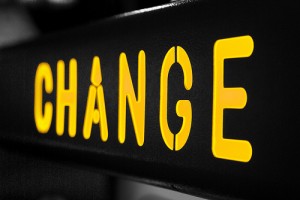For more on this series, go back and read part 1: who I am and part 2: getting the diagnosis.
In the middle of my 3+ hour assessment, the doctor took a moment apart from the testing and asked me “so what exactly is it that you’re hoping to get out of this? What are you hoping will happen if you are diagnosed with autism?”
I swear to you, with no exaggeration, I had rehearsed answering that question in my head at least a dozen times prior to going into that assessment but the moment it came out of his mouth… I didn’t have an answer.
 Change
Change
Up until the doctor had asked me the question, out loud, I had always assumed that nothing would change. That I really only wanted the diagnosis for my own curiosity, to answer questions I’ve had and to maybe help me with my own identity. Not just for myself but for where I stand in the autism community.
But when he asked me… even though I heard the specific words… my mind told me that he had actually said “what do you expect to change?”
And I had nothing.
I’m a grown up now. I don’t change. I have always been how I am. I always will be.
A doctor telling me I have autism certainly wasn’t going to change that.
In fact, if anything… it was going to cement it!
If I am how I am because it’s a part of who I am… do I even have the choice to change it?
I thought about my son, Cameron, who’s been diagnosed with autism for 3 years now… take social gatherings as just one example. I know full well that he will never ever enjoy social gatherings, much less want to go to them. I know that he is going to have to if he is to learn to cope.. but that being who he is… he’ll never actually want to go.
And I can’t change that no matter what I could try or how much I could want to. It’s who he is.
If I come to accept that in my son, that there are just some things that won’t and can’t change for him, I would have to do the same for myself.
Line of thinking
So I get to wondering why I heard a very different (yet kinda similar) question in my head than what actually came out of the doctor’s mouth and I start to wonder why I am so concerned about whether or not I could change even if I wanted to.
My wife accepts me for who I am. I mean, she married me… she must. But even more so since we came to the realization that autism would explain a lot about me. Far more, even still, since I got my official diagnosis and confirmed everything.
Still though… a part of me doesn’t want her to. She shouldn’t have to accept that I won’t change for her. Wait, let me rephrase that…
She and I have come to accept that our child will always be who he is, not just because of who he is but because autism kind of enforces that more so. He’ll never like some things, he’ll always obsess over other things, he’ll prioritize things differently than most people might… we want to help him with these things but accept that it’s just how and who he is.
I love and cherish my wife for being willing to do the same thing for me but I really don’t want her to have to do that. A marriage isn’t about one person doing all the changing while the other does not, whether due to a disorder or not. It’s supposed to be a compromise and a team effort.
The diagnosis really hasn’t changed anything… not yet. And while I feel like it should have given me every excuse I would ever need to not even try to change anything… it has actually done the opposite.
No, I don’t expect that I’ll ever enjoy social gatherings or anything that I’ve never enjoyed in all my years thus far… but still, I want to do better than just “cope”. I want to prioritize differently. I want to do better.
The wonderfully unexpected outcome
One could argue that a strong desire to make my marriage work even better than it did before is the best one could hope for from getting a disorder diagnosis… but actually, it’s not the best part.
The day that I received my diagnosis, I had my son Cameron sit down after school so that I could tell him the news.
I asked him “Cameron… who in our family has autism?”
He replied “Me.”
I said “Well, I talked to the doctor today and found out something new… you’re not the only one in our family that has autism.”
He looked at me said “You have autism now too?”
I told him “Well, I think I always did but now I know for sure. So now I know, and you know, that you’re not the only one with autism.”
He kept his head down as he played with his toys.
I asked him “So? How does that make you feel?”
He said “good” and left to play.
A couple of days later, while the four of us (myself, my wife, Cameron and his little brother Tyler) went swimming at the local pool, Cameron and I were off by ourselves and he said, “Dad, you know why you and me are the same and Tyler and mom are different?”
I said “No, why?”
He said “Because we have autism!”
Since that day, he’s been quite excited about how he and I are the same… and to be honest, so have I.
When I think about the future he has ahead of him, the great times and the struggles that I know he’ll have… I know now that I’ll be able to help him in a way that I never could have before.
I mean, I’m still me. It’s not like the diagnosis gave me Aspergers. I had it before hand. But now? Now that I know it and now that he knows it… he’ll know that I understand what he’s going through.
He’ll know that he can talk to me about just about anything without worrying that I’ll think he’s weird, or strange or.. what ever.
What ever may come, I’ll be there for him. And he knows it.
He’s already a lot happier. He already feels less alone.
That alone makes the diagnosis… no, it makes my entire life worth it.
 Going forward
Going forward
Everyone handles news differently, and life situations, goals, stresses… well, you get the idea. So I don’t expect that anyone else would receive an autism diagnosis and feel motivated to change. In fact, if I was to guess, I’d imagine not many have that same reaction.
But that’s part of the beauty of the diagnosis, I think. You never really know how it will affect you until after it does.
You can practice the things you’ll say and prepare for how you want to feel about it… but you just won’t know until after the fact.
And it’s true, doctors could get your diagnosis wrong just as easily as you could have gotten wrong yourself. So no, it’s not a guarantee… maybe I was sure, maybe the doctor is sure… and yet, maybe I still don’t actually have Aspergers. Seems odd to think about, doesn’t it? It seems odd to say it… or write it.
Still though, as much as life has no guarantees for you and there will always still be some margin of doubt… it’s still very relieving be officially diagnosed with Aspergers.
Which is odd.
Think about it.
A doctor has just told you that you have a disorder… that you fit the criteria somewhere in their big book of “things wrong with some people” and you feel relieved by it.
It’s also weird to think that, my entire experience with autism and the autism community has been through my son. I write about him, I experience autism through him, I learn about autism from him… and yet, now, with a single line on a piece of paper… I realize that my entire experience with autism was actually in fact… my own entire life… and I didn’t even know it.
Well, ok, I sort of knew it, or suspected it, for a couple of years there, most recently… but you get the idea.
The point is, it’s a relief. Because I know what I’m dealing with now. I know what I’ve always been dealing with only… I didn’t really know I was dealing with it. To me, life was always just… hard.
Which brings me to my final thought…
 Hurdles
Hurdles
I know this young woman who’s whole life has revolved around her. She wouldn’t even let having a child at a young age interfere with that. She partied all the time, was only concerned about what her circle of friends thought about her, neglected her family, neglected her schooling, work and other responsibilities, she felt she needed to just do what ever she wanted to do and not care about anything else.
But then, not too long later, I noticed that she was starting to ask a lot of questions such as “why is life so hard?” and “why does everything have to suck for me so much” and “what did I do for all this crap to happen to me?”
I shook my head. I really did. Loudly. You’re trying to picture that right now, aren’t you?
Since getting my diagnosis, I’ve taken a long look at my life… there’s been a lot of unhappiness. There’s been a lot of discomfort. To be honest, I’ve asked a lot of the same questions. Why is life so hard? Why does the universe seem to hate me so much? Why does nothing ever seem to go my way?
But you know what? I finished college. I have been a web developer for over 12 years now and done well. I have a beautiful wife, two great kids and a roof over our heads.
I’ve made something of my life… despite, what I know now, is something very very real. A very definite hurdle that gave me a very real reason to ask… why me? Why is it so hard? Turns out there really was a reason.
One thing this diagnosis has done for me, as cruel as it sounds, is that it’s made me want to sit down with that young lady, put my elbow on the table and my chin in my hand, tilt my head sideways and say to her “Life is hard huh? Nothing goes the way you want it too huh? Please, tell me all about how hard it is for you, party girl.”
Because a few years ago, I’d still shake my head at her but I’d sympathize because my life was hard too. Sure, I know it’s because she’s done it to herself, where as I did not. But I didn’t know why life was hard for me at the time.
But now? Now that I know what I was actually up against that whole time? In comparison to her doing anything she wanted and yet complaining that she can’t do anything she wants??
Yes, I’m feeling a little… I don’t even know what you’d call it.
See, I don’t want to “smack some sense into her” so to speak (I’m not voilent so please take that as the figure of speech that it is), but rather, I’d really like to use what I’ve learned to help her see just how good she’s really had it all this time.
I’d really like for her to see that her biggest hurdle isn’t something that she can’t identify… it’s her. Her choices. And that she has the potential to do just as well, in fact, far far better than I have, if only she could see that.
If I could overcome what I didn’t even recognize, then she can certainly do better when she doesn’t have that to deal with.
All this is to say… I just want to help. I feel this diagnosis isn’t about me. It’s about that young woman. It’s about my son. It’s about my wife. It’s about anyone who reads what I write, looking for answers or inspiration.
Before, I’d say that the one with Aspergers (in this case, me) is the one that need not change, need not focus on anyone but himself following something like a diagnosis, to reflect and find purpose.
But now? Now I’m thinking… I do need change. I do need to focus on those around me. To help as best I can. To do the best I can.
My wife and I will be fine. I will do my best to meet her half way in all things.
My invisible hurdles will not be my son’s invisible hurdles.. they’ll be completely visible, and I’ll be there to help and encourage him over them.
And for those who think life is hard, or need a little inspiration or simply have a question… I want to be there for them. Maybe not in person, because the diagnosis didn’t hit me that hard! I still don’t much like social settings. But certainly, I can help online.
My blog, through social media, through my other writings… autism has been important for me for a long time now. Because my son is important. But now, now it’s important because it’s important to me.
I’ve said that 1 in 88 is not the number of people affected by autism, it’s the number diagnosed… well, now, some of those affected people are affected because of me.
And I am going to do everything in my power to make sure that the effect it has is a positive one.



8 Responses to I have Aspergers – Part 3: Life after an autism diagnosis